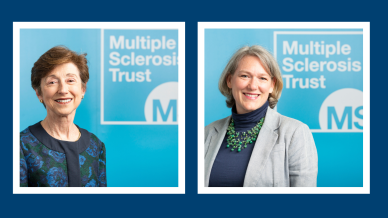The MS Trust are delighted to welcome Caitlin Sorrell as the new Chair of trustees from December 2020. She will replace outgoing Chair, Laura Chapman, who has been at the helm for the last five years.
Laura, who retired as Chief Executive of the Freemasons' Grand Charity in 2016 says “I am incredibly proud of the work the MS Trust has accomplished over the last five years. In particular the Specialist Nurse and Advanced MS Champions programmes, which have made a real tangible difference to people living with MS. I have no doubt that under Caitlin's leadership, the Trust will become ever more effective and widely seen as the focal point to which people with MS turn for help.”
New Chair Caitlin Sorrell, has worked in a variety of marketing and commercial roles in retail pharmacy for over 20 years. After starting out in Boots as a graduate, she worked for Walgreens Boots Alliance until 2017, as Managing Director of Alphega Pharmacy, a European network of independent pharmacies. She is currently working towards a qualification as a Health Psychologist.
We caught up with Caitlin just before she takes the reins to find out what motivated her to take on not just a trustee role, but also the role of Chair of the MS Trust board of trustees.
What first attracted you to become an MS Trust trustee?
My husband was diagnosed with relapsing-remitting MS in 2009, after almost four years of symptoms. After diagnosis my husband had to pick a DMT, it was the MS Trust's decision-making tool that we turned to, to help us navigate such an important decision. Since then, our MS nurses have also provided us with a lot of support, and we were aware of the work that the MS Trust does to support specialist nurses and other healthcare professionals.
Soon afterwards in 2015, we decided to run the London Marathon and after the support they had given us, we chose to run it for the MS Trust. I remember chatting to the MS Trust staff after the marathon and thinking to myself that I'm not a great runner, and there must be other things that I'm better at that could be of use to the MS Trust! Shortly thereafter the MS Trust advertised that they were looking for trustees and I saw that as an opportunity to put my skills to good use.
What made you want to take on the role of Chair?
When Laura announced that she would be standing down, I felt it would be good for the Trust to have a Chair from amongst the existing trustees, because they would have an existing understanding of the hard work that has gone before and the issues that the Trust faces. I put myself forward for consideration because I felt that I had enough time and energy to commit to the role. I served as the non-executive Chair of a Dutch pharmacy business a few years ago, so I felt that I had some previous experience and skills to bring to the role. Most importantly, I care about the future of the MS Trust, because I think it has a unique contribution to make, to people with MS and to the health professionals that care for them.
What do you see as the main challenges in the MS community in the next 12 months?
When I threw my hat in the ring for the role of Chair, I had no idea of the challenges that were on the horizon. A year ago, we knew that MS services across the UK were overburdened, and we knew that people with MS weren't always getting the level of care that they need. Then COVID-19 hit, and the NHS diverted resources to fighting the pandemic. The pandemic is far from over and people with MS have concerns about what that means for them. Should they be shielding? What might the effect of a vaccine be on their DMT and vice-versa? So the biggest challenges will be providing access to MS services for the people who rely on them, supporting the healthcare professionals that have been tested to the limit, and continuing to provide people with MS with the answers they need in the face of so many unknowns.
What are the key priorities for the MS Trust in the next 12 months?
Before I answer that, I want to thank the staff at the MS Trust who responded brilliantly to the challenges that the pandemic brought, and who continued to work incredibly hard to deliver the Trust's aims. In addition, I want to thank all the people who donated to the MS Trust emergency campaign at a time of great economic uncertainty.
We've seen an increase in the number of calls to our Enquiry Line, and an increase in the number of visits to our website and we want to continue to provide the information to people who need it, improving on it where we can.
We want to support the NHS in the re-opening of MS services. We know that Advanced MS champions and MS nurses benefit people with MS, but also benefit the NHS. We want to gather the evidence to demonstrate this, and use this evidence to make the case for better services, particularly in under-served areas.
We want to continue to support the Health Professionals that support people with MS, and to do so we will continue to develop our digital skills, hopefully culminating in a fantastic virtual conference.
We can't rely on the fundraising methods that have been successful for us in the past (such as the London marathon), so we need to develop other ways of engaging with donors to secure the funds we need to support the MS community.
Finally, and this is possibly the biggest challenge of all, we want to make sure that people with MS are heard.



